裕兴新概念英语第二册笔记 第01课精排
- 格式:doc
- 大小:73.00 KB
- 文档页数:14
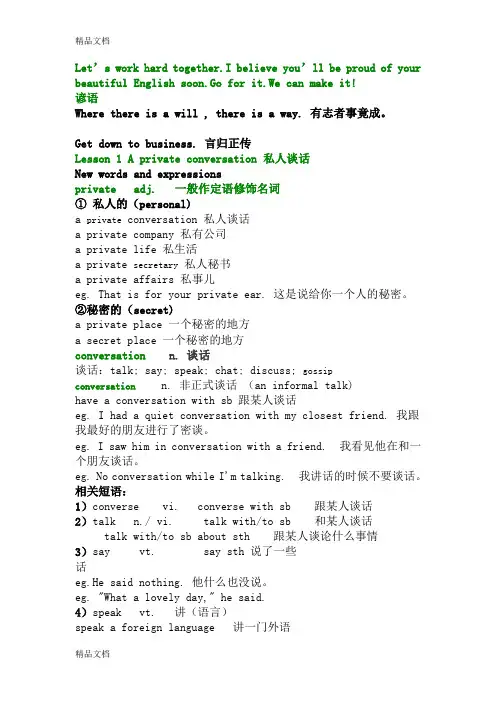
Let’s work hard together.I believe you’ll be proud of your beautiful English soon.Go for it.We can make it!谚语Where there is a will , there is a way. 有志者事竟成。
Get down to business. 言归正传Lesson 1 A private conversation 私人谈话New words and expressionsprivate adj. 一般作定语修饰名词① 私人的(personal)a private conversation 私人谈话a private company 私有公司a private life 私生活a private secretary私人秘书a private affairs 私事儿eg. That is for your private ear. 这是说给你一个人的秘密。
②秘密的(secret)a private place 一个秘密的地方a secret place 一个秘密的地方conversation n. 谈话谈话:talk; say; speak; chat; discuss; gossipconversation n. 非正式谈话(an informal talk)have a conversation with sb 跟某人谈话eg. I had a quiet conversation with my closest friend. 我跟我最好的朋友进行了密谈。
eg. I saw him in conversation with a friend. 我看见他在和一个朋友谈话。
eg. No conversation while I'm talking. 我讲话的时候不要谈话。
相关短语:1)converse vi. converse with sb 跟某人谈话2)talk n./ vi. talk with/to sb 和某人谈话talk with/to sb about sth 跟某人谈论什么事情3)say vt. say sth 说了一些话eg.He said nothing. 他什么也没说。
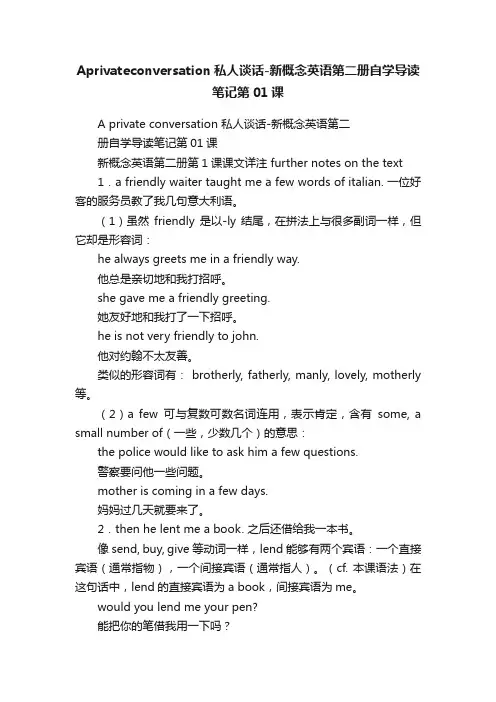
Aprivateconversation私人谈话-新概念英语第二册自学导读笔记第01课A private conversation 私人谈话-新概念英语第二册自学导读笔记第01课新概念英语第二册第1课课文详注 further notes on the text1.a friendly waiter taught me a few words of italian. 一位好客的服务员教了我几句意大利语。
(1)虽然friendly是以-ly结尾,在拼法上与很多副词一样,但它却是形容词:he always greets me in a friendly way.他总是亲切地和我打招呼。
she gave me a friendly greeting.她友好地和我打了一下招呼。
he is not very friendly to john.他对约翰不太友善。
类似的形容词有: brotherly, fatherly, manly, lovely, motherly 等。
(2)a few可与复数可数名词连用,表示肯定,含有some, a small number of(一些,少数几个)的意思:the police would like to ask him a few questions.警察要问他一些问题。
mother is coming in a few days.妈妈过几天就要来了。
2.then he lent me a book. 之后还借给我一本书。
像send, buy, give等动词一样,lend能够有两个宾语:一个直接宾语(通常指物),一个间接宾语(通常指人)。
(cf. 本课语法)在这句话中,lend的直接宾语为a book,间接宾语为me。
would you lend me your pen?能把你的笔借我用一下吗?yesterday i lent my dictionary to mary.昨天我把字典借给了玛丽。
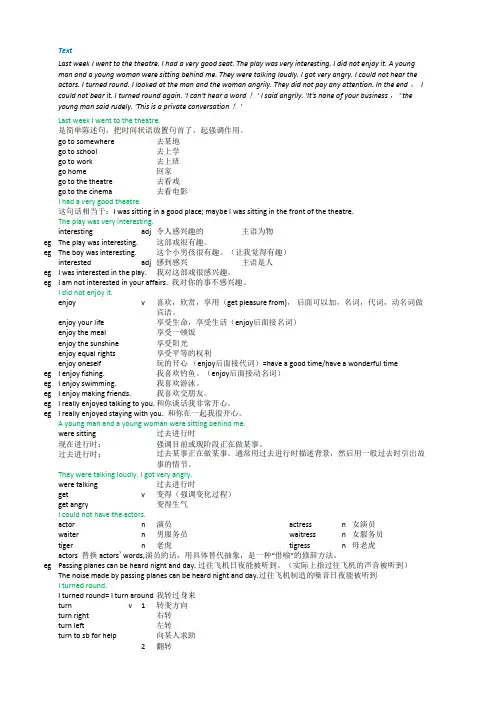
TextLast week I went to the theatre.是简单陈述句,把时间状语放置句首了,起强调作用。
go to somewhere 去某地go to school 去上学go to work 去上班go home 回家go to the theatre 去看戏go to the cinema 去看电影I had a very good theatre.这句话相当于:I was sitting in a good place; maybe I was sitting in the front of the theatre.The play was very interesting.interesting adj 令人感兴趣的 主语为物eg The play was interesting.这部戏很有趣。
eg The boy was interesting.这个小男孩很有趣。
(让我觉得有趣)interested adj 感到感兴主语是人eg I was interested in the play.我对这部戏很感兴趣。
eg I am not interested in your affairs. 我对你的事不感兴趣。
I did not enjoy it.enjoy v enjoy your life 享受生命,享受生活(enjoy 后面接名词)enjoy the meal 享受一顿饭enjoy the sunshine 享受阳光enjoy equal rights 享受平等的权利enjoy oneself 玩的开心 (enjoy 后面接代词)=have a good time/have a wonderful time eg I enjoy fishing.我喜欢钓鱼。
(enjoy 后面接动名词)eg I enjoy swimming.我喜欢游泳。
eg I enjoy making friends.我喜欢交朋友。
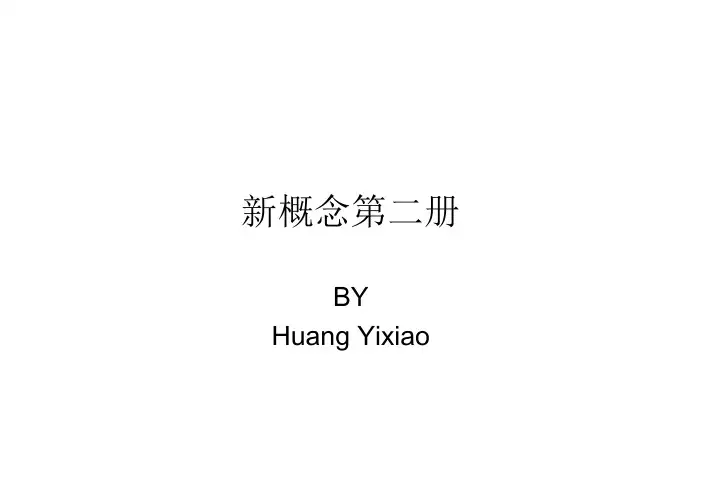
新概念第二册BYBYHuang YixiaoIntroduction•学习方法和指导法指•系统性、趣味性、实用性•That is the most systematic, the most interesting and the most practical.i t ti d th t ti l•本册分为四个单元,每单元都是在复习前面的基础上补充新的内容。
•每课都分为:单词,关键句型,课文(难每课都分为单词关键句型课文(难点),补充内容(谚语,绕口令)等Introduction(2)Introduction (2)•Let’s work hard together. I believe you’ll be p y gproud of your beautiful English soon.•Where there is a will, there is a way.•(有志者事竟成)•Now, get down to businesso,get do to bus ess•(言归正传)Lesson1A private conversation Lesson 1 A private conversation•This story is about some people in the theatre.•Before the listening…Wh did th it l t k?•Where did the writer go last week?y d d t e e joy t e p ay•Why didn’t he enjoy the play?•What did the young man say to the writer?Answers•He went to the theatre.Because he could not hear the actors. A •Because he could not hear the actors A young man and a young woman were talking loudlytalking loudly.•He said,” it’s none of your business, it’s a private conversation.”New Words&Expressions New Words & Expressions •Private adj. 私人的的Conversation n. 谈话•Conversation n•Theatre n.剧场,戏院•Seat n.座位Play n•Play n. 戏•Loudly adv.大声地New Words&ExpressionsNew Words & Expressions(2)•Angry adj.生气的Angrily adv. 生气地•Angrily adv•Attention n. 注意•Bear (bore, borne) v.容忍Business n•Business n.事•Rudely adv. 无礼地,粗鲁地Private•Private adj.•私人的(personal)•A private conversation, a private company, a private life, a private secretary, privatei t lif i t t i t affairs•Eg. That is for your private car.•私密的p p p•A private place, a secret placeConversationConversation•Conversation n. 谈话•近义词:Talk; say; speak; chat; discuss; gossipy p g p •Conversation n. 非正式谈话(an informal talk)-have a conversation with sbhave a conversation with sb•Eg. I had a quite conversation with my closest friend.friend•I saw him in conversation with a friend.•No conversation while I am talking.•Conversation v.Conversation with sb.•Conversation with sb•Talk n./v. : talk with / to sb. (about sth.)•Say vt.Say sth•Say sth•Eg. He said nothing.•“What a lovely day”, he said.•Speak vt.Speak a foreign language •Speak a foreign language •Speck Chinese•Speak EnglishSpeak vi•Speak vi.•Speak to sb.•Speech n. Make a peech•Chat n./v. 聊天(talk friendly)•We had a long chat about old times We had a long chat about old times.•Discuss v. 有着严肃目的的讨论•Discussion n.Gossip v/n refers to talk about private •Gossip v./n. refers to talk about private lives of other people (贬义)•He is nothing but a gossipTheatreTheatre•Theatre n. (in US: Theater) Metre–meter•Metre –meter•Centre –center•Go to the theatreGo to the theatre•Go to the movies•Go to the filmG h fil•Go to the cinema•Theatre =(口语) play houseg p y g •Theatre goer 戏迷play goerSeatSeat•SeatS t•区别别•Seat n./vt. Si:t•Sit vi sitSit vi sit•Chair•Eg. We don’t have enough chairs here.•SeatSeat•Eg. Is this seat taken?座位座•1.n.座位。
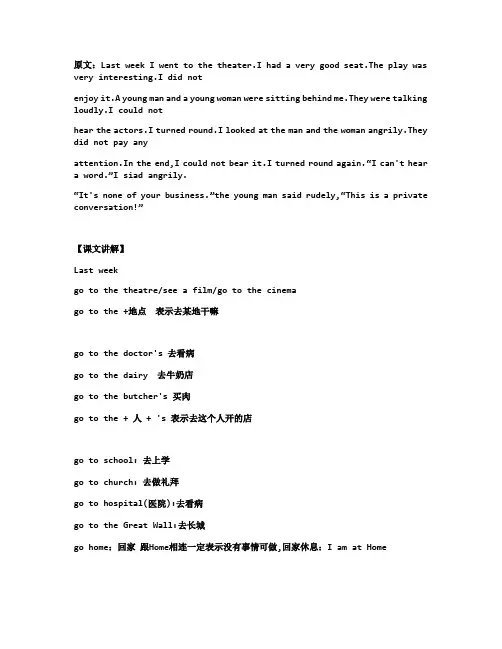
原文:Last week I went to the theater.I had a very good seat.The play was very interesting.I did notenjoy it.A young man and a young woman were sitting behind me.They were talking loudly.I could nothear the actors.I turned round.I looked at the man and the woman angrily.They did not pay anyattention.In the end,I could not bear it.I turned round again.“I can't hear a word.”I siad angrily.“It's none of your business.”the young man said rudely,“This is a private conversation!”【课文讲解】Last weekgo to the theatre/see a film/go to the cinemago to the +地点表示去某地干嘛go to the doctor's 去看病go to the dairy去牛奶店go to the butcher's 买肉go to the + 人 + 's 表示去这个人开的店go to school: 去上学go to church: 去做礼拜go to hospital(医院):去看病go to the Great Wall:去长城go home:回家跟Home相连一定表示没有事情可做,回家休息:I am at Homeenjoy oneself:玩的开心enjoy+sth :喜欢,从当中得到一种享受I like something very much./I love something.I enjoy the class.I enjoy the music.I enjoy the book.enjoy the dinner/film/progeam/gamewere sitting :当时正座在过去进行时态 :过去的某个时间正在发生的动作一个故事的背景往往用进行时态描述I+be+v(ing)The girl was reading a book in the garden.A boy came to her.get :变得,表示一种变化,get angryI am angry 是一个事实I get angry:强调变化过程It is hot.It get hot.get取代be动词,got是一个半联系动词,可以直接加形容词说话的时候喜欢用缩略.I'm not,he isn't,they aren't写的时候会说:I am not,he is not,they are notI didn't do sth,I did not do sthhear+人:听见某人的话I could not hear you.Beg your pardon?I couldn't hear you./I couldn't hear a word./I couldn't catch your word.I couldn't hear you clearly./I couldn't catch your words.Pardon? /I couldn't catch your words.turn round:转头生词和短语1.private adj.私人的it's my private letter ;private school:私立学校public:公众的,公开的public school ; public letter 公开信;public place :公共场所privacy:隐私n. It's a privacy. adj.《Private Ryan》 private soldier:大兵private citizen普通公民 private life:私生活2.conversation n.谈话subject of conversation:话题talk.可以正式,也可以私人的conversation. 比较正式一些let's have a talkThey are having a conversation.conversation 用的时候比talk正式,意思上往往不非常正式. talk:可正式可不正式dialogue:对话China and Korea are having a dialogue. 正式chat: 闲聊gossip:嚼舌头have a + talk/chat/dialogue/conversation/gossip 名词变动词3.theatre n.剧场,戏剧cinema/film:电影院4.seat n.座位seat oneselfhave a good seat(place)take a seat : 座下来,就座take your seat/take a seat/be seatedIs the seat taken?这个座位有人吗?no/yessit:sit down ,pleaseseat:take your seat,pleasebe seated,please 更为礼貌seat是及物动词,后面有宾语sit是不及物动词,后面不加宾语seat后面会加人; seat sbyou seat him;你给他找个位置。
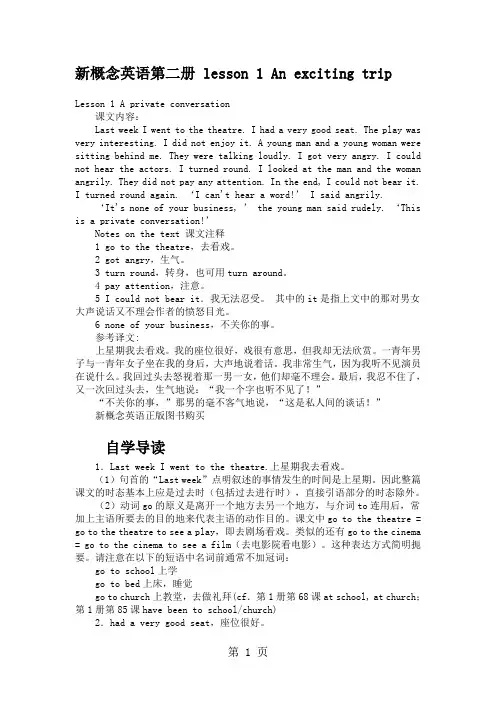
新概念英语第二册 lesson 1 An exciting tripLesson 1 A private conversation课文内容:Last week I went to the theatre. I had a very good seat. The play was very interesting. I did not enjoy it. A young man and a young woman were sitting behind me. They were talking loudly. I got very angry. I could not hear the actors. I turned round. I looked at the man and the woman angrily. They did not pay any attention. In the end, I could not bear it.I turned round again. ‘I can't hear a word!’ I said angril y.‘It's none of your business, ’ the young man said rudely. ‘This is a private conversation!’Notes on the text 课文注释1 go to the theatre,去看戏。
2 got angry,生气。
3 turn round,转身,也可用turn around。
4 pay attention,注意。
5 I could not bear it.我无法忍受。
其中的it是指上文中的那对男女大声说话又不理会作者的愤怒目光。
6 none of your business,不关你的事。
参考译文:上星期我去看戏。
我的座位很好,戏很有意思,但我却无法欣赏。
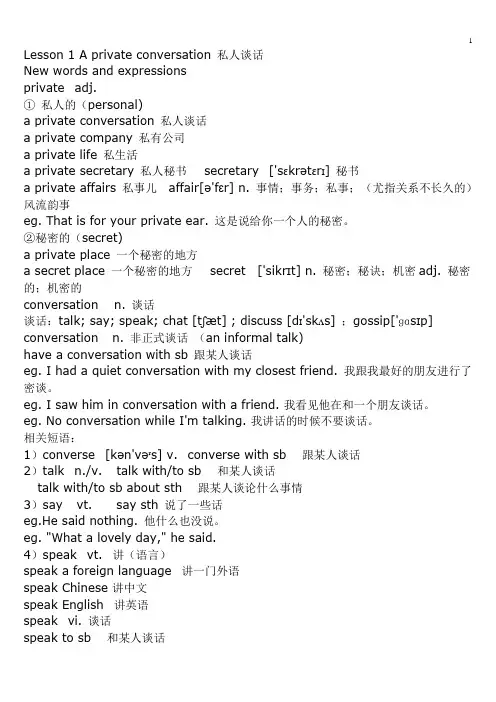
Lesson 1 A private conversation 私人谈话New words and expressionsprivate adj.①私人的(personal)a private conversation 私人谈话a private company 私有公司a private life 私生活a private secretary 私人秘书secretary ['sɛkrətɛrɪ] 秘书a private affairs 私事儿affair[ə'fɛr] n. 事情;事务;私事;(尤指关系不长久的)风流韵事eg. That is for your private ear. 这是说给你一个人的秘密。
②秘密的(secret)a private place 一个秘密的地方a secret place 一个秘密的地方secret ['sikrɪt] n. 秘密;秘诀;机密adj. 秘密的;机密的conversation n. 谈话谈话:talk; say; speak; chat [tʃæt] ; discuss [dɪ'skʌs] ;gossip['ɡɑsɪp] conversation n. 非正式谈话(an informal talk)have a conversation with sb 跟某人谈话eg. I had a quiet conversation with my closest friend. 我跟我最好的朋友进行了密谈。
eg. I saw him in conversation with a friend. 我看见他在和一个朋友谈话。
eg. No conversation while I'm talking. 我讲话的时候不要谈话。
相关短语:1)converse [kən'vəʳs] v. converse with sb 跟某人谈话2)talk n./v. talk with/to sb 和某人谈话talk with/to sb about sth 跟某人谈论什么事情3)say vt. say sth 说了一些话eg.He said nothing. 他什么也没说。
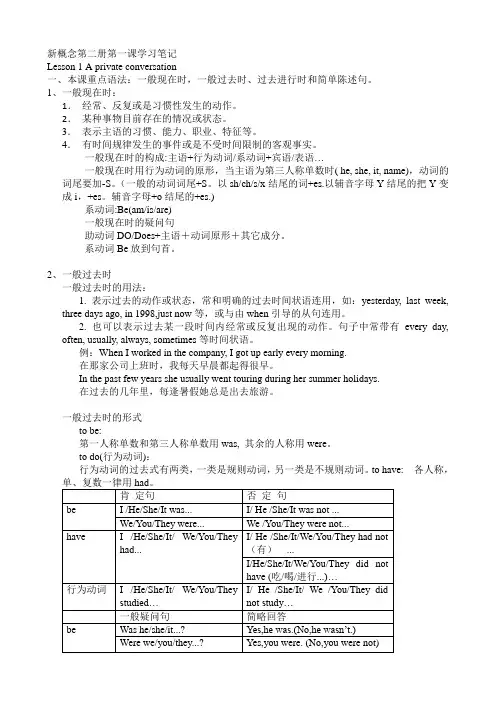
新概念第二册第一课学习笔记Lesson 1 A private conversation一、本课重点语法:一般现在时,一般过去时、过去进行时和简单陈述句。
1、一般现在时:1.经常、反复或是习惯性发生的动作。
2.某种事物目前存在的情况或状态。
3.表示主语的习惯、能力、职业、特征等。
4.有时间规律发生的事件或是不受时间限制的客观事实。
一般现在时的构成:主语+行为动词/系动词+宾语/表语…一般现在时用行为动词的原形,当主语为第三人称单数时( he, she, it, name),动词的词尾要加-S。
(一般的动词词尾+S。
以sh/ch/s/x结尾的词+es.以辅音字母Y结尾的把Y变成i,+es。
辅音字母+o结尾的+es.)系动词:Be(am/is/are)一般现在时的疑问句助动词DO/Does+主语+动词原形+其它成分。
系动词Be放到句首。
2、一般过去时一般过去时的用法:1. 表示过去的动作或状态,常和明确的过去时间状语连用,如:yesterday, last week,three days ago, in 1998,just now等,或与由when引导的从句连用。
2. 也可以表示过去某一段时间内经常或反复出现的动作。
句子中常带有every day,often, usually, always, sometimes等时间状语。
例:When I worked in the company, I got up early every morning.在那家公司上班时,我每天早晨都起得很早。
In the past few years she usually went touring during her summer holidays.在过去的几年里,每逢暑假她总是出去旅游。
一般过去时的形式to be:第一人称单数和第三人称单数用was, 其余的人称用were。
to do(行为动词):行为动词的过去式有两类,一类是规则动词,另一类是不规则动词。
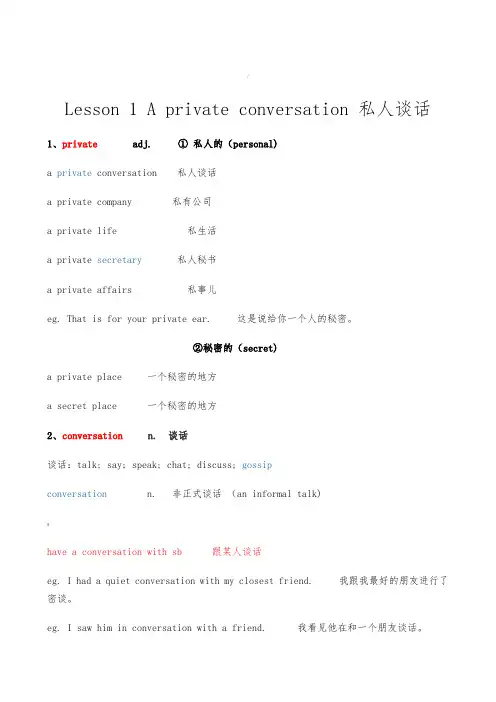
/Lesson 1 A private conversation 私人谈话1、private adj. ①私人的(personal)a private conversation 私人谈话a private company 私有公司a private life 私生活a private secretary私人秘书a private affairs 私事儿eg. That is for your private ear. 这是说给你一个人的秘密。
②秘密的(secret)a private place 一个秘密的地方a secret place 一个秘密的地方2、conversation n. 谈话谈话:talk; say; speak; chat; discuss; gossipconversation n. 非正式谈话(an informal talk)$have a conversation with sb 跟某人谈话eg. I had a quiet conversation with my closest friend. 我跟我最好的朋友进行了密谈。
eg. I saw him in conversation with a friend. 我看见他在和一个朋友谈话。
eg. No conversation while I'm talking. 我讲话的时候不要谈话。
相关短语:1)converse v.不及物动词,谈话 converse with sb 跟某人谈话2)talk n./v. talk with / to sb 和某人谈话talk with/to sb about sth 跟某人谈论什么事情:3)say vt. say sth 说了一些话said nothing. 他什么也没说。
eg. "What a lovely day," he said. 天气多好呀,他说4)speak vt. 讲(语言)speak a foreign language 讲一门外语speak Chinese 讲中文speak English 讲英语speak vi. 谈话speak to sb 和某人谈话speech n. 讲话谈话 make a speech 做演讲5)chat n./v. 聊天(talk friendly 友好地谈话)eg. We had a long chat about old times. 我们聊了很多关于过去的事。
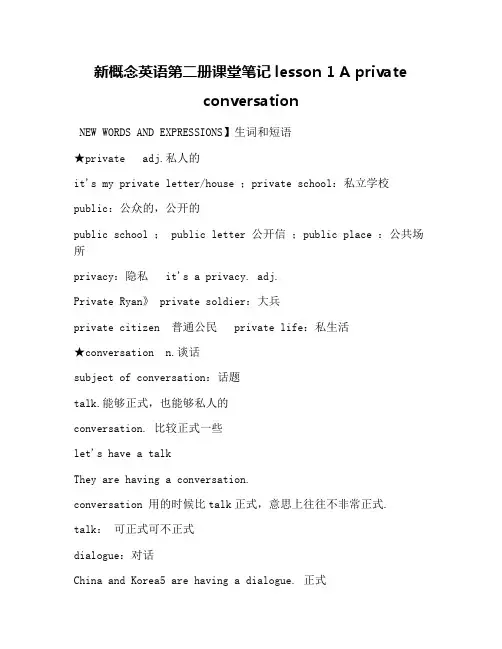
新概念英语第二册课堂笔记lesson 1 A privateconversationNEW WORDS AND EXPRESSIONS】生词和短语★private adj.私人的it's my private letter/house ;private school:私立学校public:公众的,公开的public school ; public letter 公开信;public place :公共场所privacy:隐私 it's a privacy. adj.Private Ryan》 private soldier:大兵private citizen 普通公民 private life:私生活★conversation n.谈话subject of conversation:话题talk.能够正式,也能够私人的conversation. 比较正式一些let's have a talkThey are having a conversation.conversation 用的时候比talk正式,意思上往往不非常正式.talk:可正式可不正式dialogue:对话China and Korea5 are having a dialogue. 正式chat:闲聊gossip6:嚼舌头have a + talk/chat/dialogue/conversation/gossip 名词变动词★theatre n.剧场,戏剧cinema:电影院★seat n.座位have a good seat(place)take a seat :座下来,就座take your seat/take a seatIs the seat taken? 这个座位有人吗?no/yessit sit down ,pleaseseat take your seat,pleasebe seated,please 更为礼貌seat是及物动词,后面有宾语sit是不及物动词,后面不加宾语seat后面会加人; seat sb; seat him; seat:让某人就座sit he is sitting there.you seat him;。
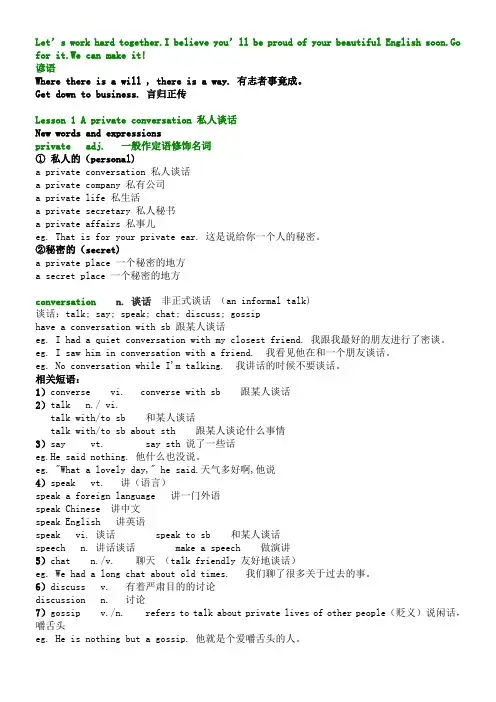
Let’s work hard together.I believe you’ll be proud of your beautiful English soon.Go for it.We can make it!谚语Where there is a will , there is a way. 有志者事竟成。
Get down to business. 言归正传Lesson 1 A private conversation 私人谈话New words and expressionsprivate adj. 一般作定语修饰名词① 私人的(personal)a private conversation 私人谈话a private company 私有公司a private life 私生活a private secretary 私人秘书a private affairs 私事儿eg. That is for your private ear. 这是说给你一个人的秘密。
②秘密的(secret)a private place 一个秘密的地方a secret place 一个秘密的地方conversation n. 谈话非正式谈话(an informal talk)谈话:talk; say; speak; chat; discuss; gossiphave a conversation with sb 跟某人谈话eg. I had a quiet conversation with my closest friend. 我跟我最好的朋友进行了密谈。
eg. I saw him in conversation with a friend. 我看见他在和一个朋友谈话。
eg. No conversation while I'm talking. 我讲话的时候不要谈话。
相关短语:1)converse vi. converse with sb 跟某人谈话2)talk n./ vi.talk with/to sb 和某人谈话talk with/to sb about sth 跟某人谈论什么事情3)say vt. say sth 说了一些话eg.He said nothing. 他什么也没说。
Lesson 1 A private conversation 二、【New words and expressions】生词和短语(12)private adj. 私人的conversation n. 谈话theatre n. 剧场,戏院seat n. 座位play n. 戏loudly adv. 大声地angry adj. 生气的angrily adv. 生气地attention n. 注意bear v. 容忍business n. 事rudely adv. 无礼地,粗鲁地1、private (1)adj. 私人的 同义词:personalprivate life 私生活private school 私立学校private letter 私人信件private conversation 私人谈话private company 私人公司private secretary 私人秘书private affairs 私事That is for your private ear. 那是说给你一个人听的秘密。
It's my private letter. (如果妈妈想看你的信)It's my private house. (如果陌生人想进你的房子)private 强调隐私 personal 仅指个人的,不强调隐私,没有秘密可言(2)adj. 秘密的 同义词:secreta private/secret place 一个秘密的地方(3)adj. 普通的private citizen 普通公民I'm a private citizen. (citizen n. 公民)private soldier 大兵《Private Ryan》(《拯救大兵瑞恩》)(4)public adj. 公众的,公开的(private 的反义词)public school 公立学校public letter 公开信public place 公共场所(5)privately adv. 私人、秘密 =in privatepublicly adv. 公开 =in public(6)privacy n.隐私It's privacy. 这是我的隐私!(不愿让别人知道的)2、conversation n.谈话 talk 内容可正式可不正式,也可以私人。
10/22/2012private adj conversation n 谈话threatre n 剧场,戏院seat n 座位play n loudly adj 大声地angry adj 生气的angrily adv 生气地attention n 注意bear (bore --boren)v 容忍business n 事rudely adv 无礼地,粗鲁地private 1adj 私人的(通常做定语修饰名词),(personal)A private conversation 私人谈话a private company 私有公司a private life 私生活a private secretary 私人秘书private affairs 私事egThat is for your private ear.这是说给你一个人的秘密。
2adj 秘密的(相当于secret)a private place= a secret place 一个秘密的地方conversation n 非正式谈话 (an informal talk)have aconversation with sb 跟某人谈话egI had a quiet conversation with my closest friend. 我和我最好的朋友进行密谈。
egI saw him in conversation with a friend. 我看见他跟朋友谈话。
egNo conversation while I am talking. 我讲话的时候不要谈话。
converse v 谈话(不及物动词)converse with sb 跟某人谈话talk n v 谈话talk with sb / talk to sb 跟某人谈话talk with sb about sth talk to sb about sth say vt 说(及物动词),后面直接跟说话的内容say sth 说了一些话egHe said nothing.他什么也没说。
lesson1单词讲解1. private adj.1) 私人的(personal)a private conversation 私人谈话a private company 私有公司a private life 私生活a private secretary 私人秘书private affairs 私事eg. That is for your private ear. 这是说给你一个人的秘密。
2) 秘密的 (secret)a private place 一个秘密的地方a secret place 一个秘密的地方2. conversation n. 谈话talk; say; speak; chat; discuss; gossipconversation n.非正式谈话 (an informal talk)have a conversation with sb. 跟某人谈话eg. I had a quiet conversation with my closest friend. 我跟我最好的朋友密谈。
eg. I saw him in conversation with a friend. 我看见他在跟一位朋友谈话。
eg. No conversation while I’m talking. 我讲话时不要谈话。
converse v. 谈话converse with sb. 跟某人谈话talk n./v. 谈论talk with/to sb. 同某人谈话talk with/to sb. about sth. 跟某人谈论某事say vt. 说say sth. 说了一些话eg. He said nothing. 他什么也没说。
eg. “What a lovely day ” , he said. “天气多好啊”,他说。
speak vt. 讲speak a foreign language 讲一门外语speak Chinese 讲中文speak English 讲英语speak vi. 说话,谈话speak to sb. 同某人谈话speech n. 讲话,谈话make a speech 发表演讲chat n./v. 聊天(talk friendly)eg. We had a long chat about old times. 我们聊了好多关于过去的事情。
Let’s work hard together.I believe you’ll be proud of your beautiful English soon.Go for it.We can make it!谚语Where there is a will , there is a way. 有志者事竟成。
Get down to business. 言归正传Lesson 1 A private conversation 私人谈话New words and expressionsprivate adj. 一般作定语修饰名词① 私人的(personal)a private conversation 私人谈话a private company 私有公司a private life 私生活a private secretary私人秘书a private affairs 私事儿eg. That is for your private ear. 这是说给你一个人的秘密。
②秘密的(secret)a private place 一个秘密的地方a secret place 一个秘密的地方conversation n. 谈话谈话:talk; say; speak; chat; discuss; gossipconversation n. 非正式谈话(an informal talk)have a conversation with sb 跟某人谈话eg. I had a quiet conversation with my closest friend. 我跟我最好的朋友进行了密谈。
eg. I saw him in conversation with a friend. 我看见他在和一个朋友谈话。
eg. No conversation while I'm talking. 我讲话的时候不要谈话。
相关短语:1)converse vi. converse with sb 跟某人谈话2)talk n./ vi. talk with/to sb 和某人谈话talk with/to sb about sth 跟某人谈论什么事情3)say vt. say sth 说了一些话eg.He said nothing. 他什么也没说。
Lesson 1 A private conversation【New words and expressions】★private① adj. 私人的private life 私生活private school 私立学校② adj. 普通的private citizen 普通公民I’m a private citizen. (citizen n. 公民)private soldier 大兵《Private Ryan》《拯救大兵瑞恩》) public adj. 公众的,公开的(private的反义词)public school 公立学校public letter 公开信public place 公共场所privacy n.隐私It’s privacy. 这是我的隐私!(不愿让别人知道的)★conversation n.谈话have a + talk/chat/dialogue/conversation/gossip 名词变动词conversation 一般用于正式文体中, 内容上往往不正式subject of conversation 话题They are having a conversation.talk 内容可正式可不正式, 也可以私人Let’s have a talk.dialogue 对话, 可以指正式国家与国家会谈China and Korea are having a dialogue.chat 闲聊,就是北京人说的“侃”,无关紧要的事。
gossip 嚼舌头, 说长道短★theatre n.剧场, 戏剧cinema n.电影院★seat n.座位have a good seat/place,这里的seat指place(指地点),而不是chair.take a seat/take your seat 坐下来, 就坐Is the seat taken? 这个位置有人吗?请坐的3种说法:Sit down, please. (命令性)Take your seat, please.Be seated, please. (更礼貌)作为动词的seat与sit的区别sit(sat,)vi. 就座He is sitting there.他坐在那儿。
Lesson 1 A private conversation 私人谈话New words and expressionsprivate adj.①私人的(personal)a private conversation 私人谈话a private company 私有公司a private life 私生活a private secretary私人秘书a private affairs 私事儿eg. That is for your private ear. 这是说给你一个人的秘密。
②秘密的(secret)a private place 一个秘密的地方a secret place 一个秘密的地方conversation n. 谈话谈话:talk; say; speak; chat; discuss; gossipconversation n. 非正式谈话(an informal talk)have a conversation with sb 跟某人谈话eg. I had a quiet conversation with my closest friend. 我跟我最好的朋友进行了密谈。
eg. I saw him in conversation with a friend. 我看见他在和一个朋友谈话。
eg. No conversation while I'm talking. 我讲话的时候不要谈话。
相关短语:1)converse v. converse with sb 跟某人谈话2)talk n./v. talk with/to sb 和某人谈话talk with/to sb about sth 跟某人谈论什么事情3)say vt. say sth 说了一些话eg.He said nothing. 他什么也没说。
eg. "What a lovely day," he said.4)speak vt. 讲(语言)speak a foreign language 讲一门外语speak Chinese 讲中文speak English 讲英语speak vi. 谈话speak to sb 和某人谈话speech n. 讲话谈话make a speech 做演讲5)chat n./v. 聊天(talk friendly 友好地谈话)eg. We had a long chat about old times. 我们聊了很多关于过去的事。
6)discuss v. 有着严肃目的的讨论discussion n. 讨论7)gossip v./n. refers to talk about private lives of other people(贬义)说闲话,嚼舌头eg. He is nothing but a gossip. 他就是个爱嚼舌头的人。
theatre n. (in US: theater)metre—meter (in US) centre—center (in US)go to the theatre 去看戏,去剧院go to the movies/cinema/film 去看电影,movie (in US):电影theatre=(口)play housetheate goer 戏迷 go+er=goer 去的人。
也可以表达为:play goer 戏迷seat (本课重点词)区别:seat n./vt. [si:t] 长音sit vi. [sit]短音chair 椅子,可以搬动的seat n. 座位,固定在某地的eg. We don't have enough chairs here. 我们没有足够的椅子。
eg. Is this seat taken? 这个座位有人坐吗?①n. 座位,座eg. Have a seat, please. / Take a seat, please. 请坐。
eg. I had a very good seat. 我的座位非常好。
相当于Maybe I sat in the front of the theatre. 也许是我坐在戏院的前面,所以说座位很好。
seatbelt=safety belt 安全带in the driver's seat = in the leader's seat/place 在领导的位置上,指某人非常重要的意思。
back-seat driver 后座司机,指的是爱指手画脚的人。
②n. 席位win/lose a seat 赢得/输掉一个席位③vt. 安排……坐下seat sb 安排某人坐下seat yourself 你请坐eg. Be seated, please. 请坐。
表示请坐的方式:eg. Sit down, please. Will you have a seat?Won't you have a seat? Would you have a seat?Be seated , please. Seat yourself, please.play①n. 玩耍,游戏,娱乐playboy 花花公子 playground 操场②v. 玩,玩耍play with sb 跟某人玩;玩弄某人(慎重使用这个短语)play with sth 玩弄,摆弄什么东西play with a ball 玩弄,摆弄一个球play with a toy 玩弄,摆弄一个玩具play gooseberry (酷栗)摆弄醋栗,表示当电灯泡,尤其是在情侣之间当电灯泡,也就是妨碍别人谈恋爱的意思。
这个短语源自西方习俗。
从前有些西方人有钱人家的女孩子都由老妈子伺候着,等到她们长大成人的时候,谈恋爱的时候,或在社交场合也有年长的女伴陪着,据说少女很难有见面的时候,有时候这个在一旁的陪伴的妇女为了便于监视,又不太露骨,便端一盘醋栗在旁包起来。
从此,play gooseberry(摆弄醋栗)便表示监视别人谈恋爱的意思,类似中文所说的在情侣之间当电灯泡的意思。
③v. 玩,比赛play football 踢足球 play basketball 打篮球 play volleyball 打台球play cards 打扑克play chess 下棋注意:在运动项目的前面不加定冠词"the"play the piano 弹钢琴 play the violin 拉小提琴 play the guitar 弹吉他注意:在乐器的前面加"the"④n. 戏剧,剧本theatre play 戏剧,剧院上映的那些TV play 电视剧soap play 电视连续剧,因为这样的电视连续在最初是由肥皂公司来赞助,在播放的间隙,穿插的都是肥皂、清洁剂等商品的广告。
play goer 戏迷eg. It is as good as a play. (像戏一样的好)好玩极了。
eg. You must come here, or, there is no play. 你必须来这儿,否则,就没戏了。
no play 没戏区别:play 戏剧,剧本drama 戏,戏剧文学,戏剧艺术opera歌剧Beijing Opera 京剧loud adj. 大声的loudly adv.大声地 aloud adv. 大声地eg. She called loudly for help.=She called aloud for help. 她大声呼救。
think aloud 自言自语adj. + ly →adv.angry adj. →angrily adv. rude adj.→rudely adv.eg. The young man said rudely. 这个年轻人粗鲁的说。
real adj. → really adv. exact adj. →exactly adv.quick adj. →quickly adv. quiet adj. →quietly adv.attention n. 注意pay attention to sth 对……给予注意pay some attention to sth 给予一定的注意pay more attention to sth 给予更多的注意pay close attention to sth 给予密切的注意pay great attention to sth 给予极大的注意pay enough attention to sth 给予足够的注意pay little attention to sth 很少注意pay no attention to sth 根本不注意,毫不理会pay no attention to... 毫不理会turn a blind eye to... 视而不见turn a deaf ear to... 充耳不闻draw one's attention/attract one's attention 吸引……注意力eg. The new type of computer draws our attention. 新款计算机吸引了我们的注意力。
attention v. 注意eg. Attention, please. 请注意。
(讲一件事情,要吸引别人的目光时可以这样用)eg. Attention, passengers. The plane leaves at 9 o'clock. 乘客们请注意,飞机在9点起飞。
(机场广播会有类似的句子)eg. Ladies and gentlemen, may I get your attention, please? 女士们先生们请注意。
(正式的场合,比如国际会议上)eg. That's all. Thank you for your attention.eg. That's all. Thank you for your time. 感谢你听我讲这些。
(讲完的时候可以用)bear①n. 熊,粗鲁蛮横的人eg. He's really a b ear. 他真是个粗鲁的家伙。
a bear market 熊市(股票下跌的行情)a bull market 牛市(股票上扬的行情)a bear hug紧紧地拥抱(熊抱)eg. The old lady saw me and came and gave me a bear hug. 那个老太太看见我,走过来,给了我一个大大的拥抱。
成语:bear's service 帮倒忙,好心做坏事源自:俄国作家克雷洛夫的寓言《隐士和熊》——有个隐士久居荒郊,后来跟一只寂寞的熊成为好朋友。